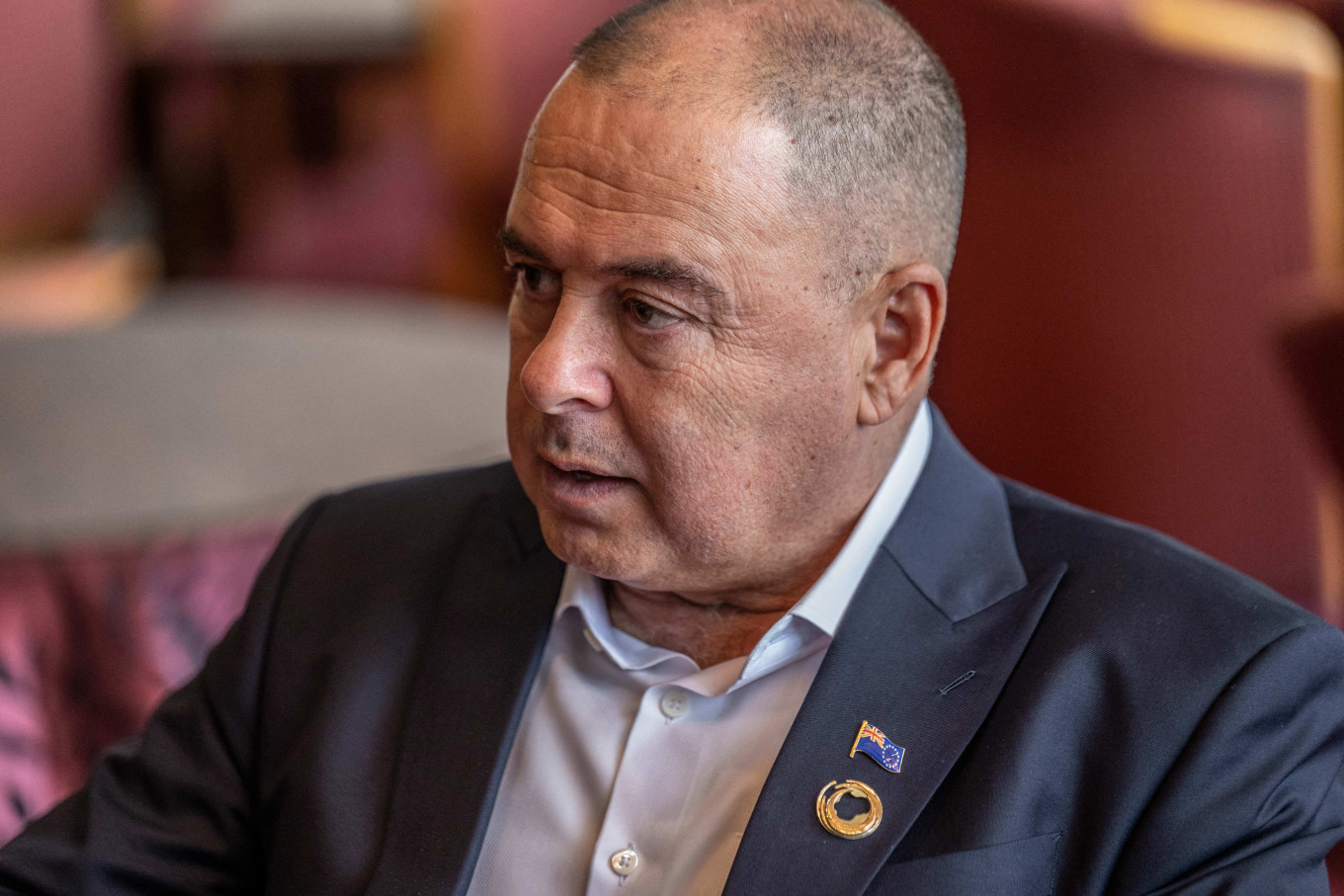Popular Reads
Top Results
Can't find what you're looking for?
View all search resultsPopular Reads
Top Results
Can't find what you're looking for?
View all search resultsPacific isles fear becoming theater for US-China rivalry
A Pacific Islands leader on Friday called on the United States and China to not bring "adversarial competition" to the region, as the rival powers intensify their bids for influence.
Change text size
Gift Premium Articles
to Anyone
A
Pacific Islands leader on Friday called on the United States and China to not bring "adversarial competition" to the region, as the rival powers intensify their bids for influence.
Cook Islands Prime Minister Mark Brown, invited to represent the region at a Group of Seven summit in Hiroshima, told AFP increased superpower interest in the Pacific was welcome, but could not come at any cost.
In recent years, China has dramatically ramped up its economic, political and military footprint in the strategic ocean region.
Beijing has snapped up mines and ports across the Pacific and inked a secretive security pact with the Solomon Islands that allows China to deploy troops to the country.
The US fears a Chinese military foothold in the South Pacific could outflank its facilities on Guam, and make defense of Taiwan more complicated.
The self-ruled, democratic island lives under constant threat of an invasion by China, which claims Taiwan as part of its territory to be seized one day, by force if necessary.
US President Joe Biden has said the US would defend the island in the event of a Chinese invasion.
Washington has opened or reopened a string of Pacific Island embassies and deployed a steady stream of envoys to court island leaders.
"We welcome that engagement into the region," said Brown, who currently chairs the Pacific Island Forum, a region-wide bloc.
He hailed a White House summit between Biden and Pacific Island leaders last year, but added: "What we don't want to see is our region being an area of adversarial competition by our development partners. We want our region to be an area of collaboration."
"For us, national security priorities are economic security, they are climate security."
Many Pacific Island nations are debt-burdened, low-lying, vulnerable to rising sea levels and exposed to ever-stronger storms, droughts and floods fueled by climate change.
The increased attention being paid to Pacific governments has seen aid, loans and construction project windfalls flow into their coffers to the tune of tens of millions of dollars.
When the US secretary of state travels through Papua New Guinea's capital next week to meet the leader of the South Pacific nation, it will be on a six-lane highway built by China.
Antony Blinken will be dispatched to meet Pacific leaders at a summit on Monday in the place of Biden, who had planned a historic visit spurred by Beijing's growing regional clout.
On a brief stop in Port Moresby, the top US diplomat will pass sites including a Chinese-built national courthouse, bus stops with Mandarin signs and even Chinese supermarkets.
The rivalry between the US and China has brought them to loggerheads in the Pacific, and their jostle for influence has been a boon for islands like resource-rich and strategically located Papua New Guinea.
"Pacific governments are relishing their place in the sun," said Gordon Peake, a senior adviser for the Pacific Islands at the US Institute of Peace.
"'Friends to all, enemies to none' is the informal foreign policy mantra of most Pacific nations and they're sticking to it, to great net effect."
Yet Pacific concern about American neglect is real.
Last year Fiji's acting prime minister told Blinken island nations felt like "small dots" to Western leaders flying to meetings where they "spoke about us, rather than with us".
Washington and its Pacific allies Australia and New Zealand have since stepped up, fearful China will capitalize and mirror its actions in the South China Sea where it has turned several outcrops into military outposts.
That Western alarm has given cautious and self-aware politicians from Fiji to Micronesia an easy opening, with eager world powers dropping financial and diplomatic incentives into their laps.
"There is little doubt that they will accept benefits from China and, particularly, Western powers falling over one another in attempts to secure influence," said Australian National University professor Ronald May.
In the last year the US has announced new embassies in Tonga and Kiribati, reopened its mission in the Solomon Islands and hosted an unprecedented Pacific summit at the White House.
It has agreed new deals with Micronesia, Palau and Papua New Guinea, the last of which gives American troops access to its ports and airports.
China has also won influence in the region, striking a secretive security deal with the Solomons, the details of which have not yet been revealed, and building the host stadium for this year's Pacific Games in the capital Honiara, as well as university dorms and a medical center.
Beijing sought a sweeping trade and security deal with Pacific nations last year but it was rejected, signaling the islands' wish to not give too much sovereignty away.
Chinese President Xi Jinping's government has plowed ahead regardless of setbacks, striking several bilateral deals with Kiribati and Tonga and steadily growing its reach.
Beijing claims it is just a development partner, asserting its great power status with aid that benefits the region.










